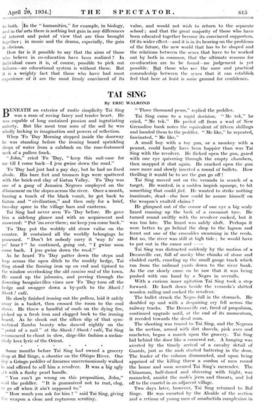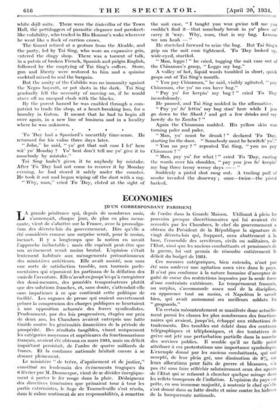TAI SING
By ERIC WALROND
BENEATH an exterior of rustic simplicity Tai Sing was a man of roving fancy and tender heart. He was capable of long sustained passion and ingratiating naivety. But like most true sons of the soil he was wholly lacking in imagination and powers of reflection.
When 'Fo 'Day Morning stepped inside the doorway he was standing before the ironing board sprinkling drops of water from a calabash on the rose-festooned neck of a pollera frock.
" John," cried 'Fo 'Day, " keep this suit-case for me till I come back—I jess gwine down the road."
'Fo 'Day had just had a pay day, but he had no fixed abode. His bare feet and trousers legs were spattered with the brick-red clay of Gatun Valley. 'Fo 'Day was one of a gang of Jamaica Negroes employed on the deboisement on the slopes across the river. Once a month, barring a touch of the black vomit, he got, back to Gatun and " civilization," and then only for a brief, two-day spree in the village bars and canteens.
Tai Sing had never seen 'Fo 'Day before. He gave him a sidelong glance and with an acquiescent nod answered: "Put 'im over there; me keep you come back."
'Fo 'Day put the wobbly old straw valise on the counter. It contained all the worldly belongings he possessed. " Don't let nobody carry it 'way fo' me yo' hear ? " he cautioned, going out, " I gwine soon come back. I jess gwine down the roi.d."- As he heard 'Fo 'Day patter down the steps and leap across the open ditch to the muddy hedge, Tai Sing stood the flaming iron up on end and tiptoed to the window overlooking the old camino real of the town. He eased up the jalousies, and peering through the flowering bougainvillea vines saw 'Fo 'Day turn off the hedge and swagger down a by-path to the Shark ! Shark ! café.
He slowly finished ironing out the pollera, laid it safely away in a basket, then crossed the room to the coal stove. He threw a handful of coals on the dying fire, picked up a fresh iron and clogged back to the ironing board. As he shook out the silken slip of that sym- metrical Zamba beauty who danced nightly on the " point of a nail " at the Shark ! Shark ! café, Tai Sing commenced to chant in slow, dirge-like fashion a melan- choly love lyric of the Orient. • • • • Some months before Tai Sing had owned a grocery shop at Bal Singe, a chantier on the Obispo River. One day a Gringo peddler of firearms unceremoniously walked in and offered to sell him a revolver. It was a big ugly .44 with a flashy pearl handle.
" You can't go wrong on this proposition, John," said the peddler. "It is guaranteed not. to rust, clog, or go off when it ain't supposed to."
" How much you ask for him ? " said Tai Sing, giving the weapon a close and rapturous scrutiny. " Three thousand pesos," replied the peddler.
Tai Sing came to a rapid decision. " Me tek," he cried, " Me tek." He peeled off from a wad of New Grenadine bank notes the equivalent of fifteen shillings and handed them to the peddler. " Me like," he repeated, fakinated, " Me like."
A small boy with a toy gun, or a monkey with a peanut, could hardly have been happier than was Tai Sing with the revolver. He flicked open the gun, gazed with one eye quivering through the empty chambers, then snapped it shut again. He cracked open the gun once more and slowly inserted a round of bullets. how thrilling it would be to see the gun go off !
Tai Sing moved out on the veranda in search of a target. He wanted, in a sudden impish upsurge, to hit something that could feel. He wanted to strike nothing inanimate, dead—else how could he assure himself on the weapon's exalted claims ?
He glimpsed out of the corner of one eye a big scaly lizard running, up the bark of a cocoanut tree. He turned round swiftly with the revolver cocked, but it was too late. The lizard -was safely aloft. Perhaps it were better to go behind the shop to the lagoon and ferret out one of the crocodiles swarming in the reeds. But no, the river was still at high tide ; he would have to put out in the canoe and — Tai Sing was distracted suddenly by the motion of a Decauville car, full of smoky blue chunks of stone and clodded earth, crawling up the small gauge track which ran from the railroad yards down to the river bank. As the car slowly came on he saw that it was being pushed with one hand by a Negro in overalls.
With a curious inner agitation Tai Sing took a step forward. He knelt down beside the veranda's slatted wooden railing and cocked the revolver.
The bullet struck the Negro full in the stomach. He doubled up and with a despairing cry fell across the railway tracks. The Decauville car, freed of propulsion, continued upgrade until, at the end of its momentum, it receded towards the dead man.
The shooting was traced to Tai Sing, and the Negroes in the section, armed with dirt shovels, pick axes and machetes, began a march upon the grocery. Tai Sing hid behind the door like a cornered rat. A hanging was averted by the timely arrival of a cavalry detail of Guards, just as the mob started battering in the door.
The leader of the column dismounted, and upon being apprised of the killing threw a cordon of men round the house and soon secured Tai Sing's surrender. The Chinaman, half-dazed and shivering with fright, was manacled, amidst the mob's jeers and threats, and led off to the cuartel in an adjacent village.
Two days later, however, Tai Sing returned to Bal Singe. He was escorted by the Alcalde of the section and a retinue of young men of assafoetida complexion in white drill suits. These were the tinterillos of the Town Hall, the pettifoggers of parasitic elegance and parokeet- like volubility, who trailed in His Honour's wake wherever he went like a flock of carrion crows.
The Guard retired at a gesture from the Alealde, and the party, led by Tai Sing, who wore an expansive grin, entered the dingy shop. There was a torrent of talk, in a patois of broken French, Spanish and pidgin English, followed by the emptying of Tai Sing's coffers. Store, gun and liberty were restored to him and a quinine cocktail mixed to seal the bargain.
But the amity of the Cabildo was no immunity against the Negro boycott, or pot shots in the dark. Tai Sing gradually felt the necessity of moving on, if he would stave off an unequal clash with the blacks.
By the purest hazard he was enabled through a com- patriot to trade the shop, at a heart-breaking loss, for a laundry in Gatun. It meant that he had to begin all over again, in a new line of business and in a locality where he was unknown.
'Fo 'Day had a Spaniard's unearthly time-sense. He returned for his valise three days later.
" John," he said, " yo' got that suit case I lef' here wit' yo' Monday ? Yo' best don't tell me yo' give it to somebody by mistake."
Tai Sing hadn't given it to anybody by mistake. After To 'Day had not come to recover it by Monday evening, he had stored it safely under the counter. He took it out and began wiping off the dust with a rag.
" Why, man," cried 'Fo 'Day, elated at the sight of the suit ease, " I taught you WUZ gwine tell me you couldn't find it—that somebody break in yo' place an' carry it 'way. Why, man, that is my bag. Lenune see um heah — " He stretched forward to seize the bag. But Tai Sing's grip on the suit case tightened. 'Fo 'Day looked up, wide-eyed, startled.
" Man, leggo ! " he cried, tugging the suit case out of the Chinaman's grasp, " Leggo my bag."
A volley of hot, liquid words tumbled in short, quick gasps out of Tai Sing's mouth.
" You pay Chinaman," he said, visibly agitated, " pay Chinaman, else yo' no can have bag."
" Pay yo' for keepin' my bag ? " cried 'Fo 'Day incredulously.
He paused, and Tai Sing nodded in the affirmative. . „ Pay yo' fo' lettin' my bag stan' here while I Jess go down to the Shark 7 and get a few drinks and say howdy do to Zamba ? "
• Again the Chinaman nodded. His yellow skin N turning paler and paler.
" Man, yo' must be drunk ! " declared To 'Day, starting for the door. " Somebody must be bewitch' yo'."
" You no pay ? " repeated Tai Sing, " you no pay Chinaman ? "
• " Man, pay yo' for what ! " cried 'Fo 'Day, casting the words over his shoulder, " pay you jess fo' keepin' my bag three teeny weeny days — " Suddenly a pistol shot rang out. A trailing puff of smoke invaded the doorway ; once—twice—the pistol barked.













































 Previous page
Previous page